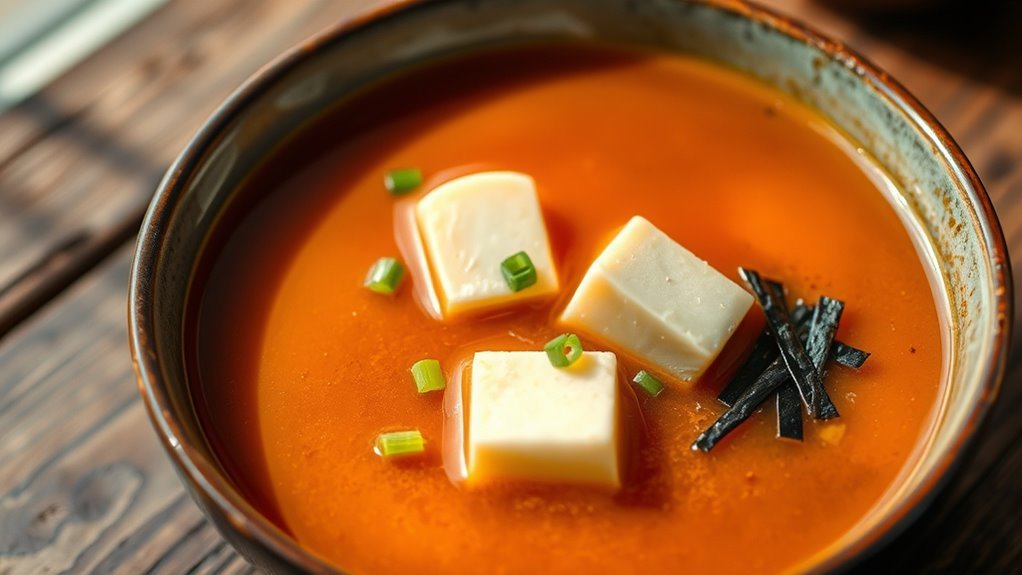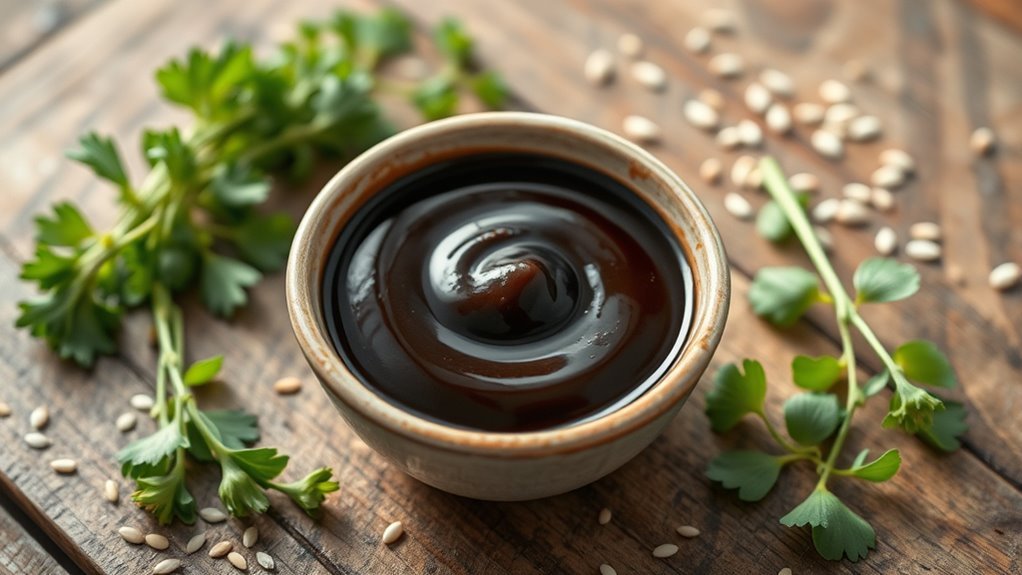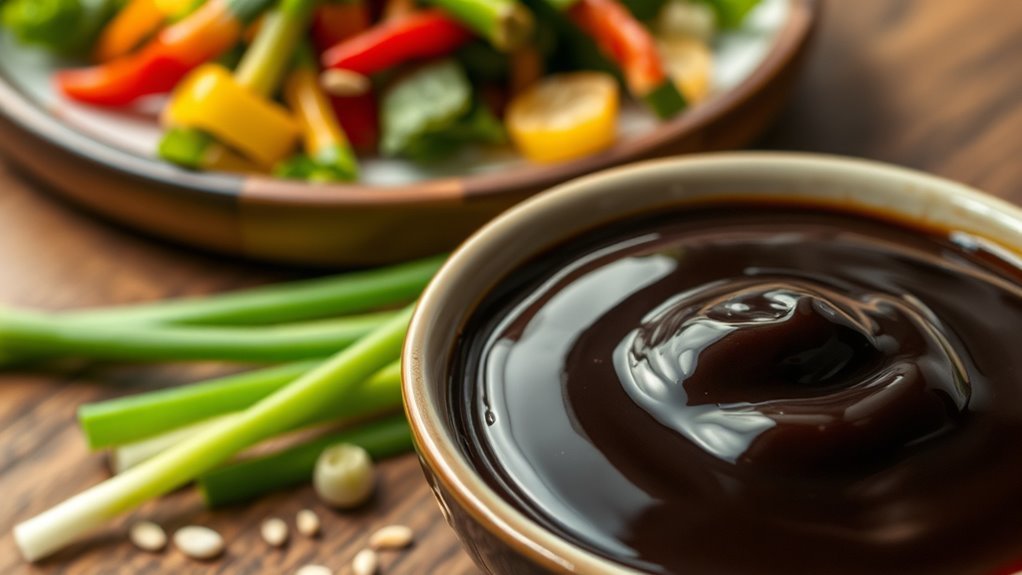Yes, miso can be keto-friendly, as it’s low in carbs and high in protein. A tablespoon contains roughly 1g of carbohydrates, making it suitable for your diet. However, watch your portion sizes, as miso is salty and high in sodium. It also provides health benefits like probiotics and antioxidants. To maximize the benefits without exceeding carb limits, you can experiment with various miso-based dressings and marinades. There’s plenty more to explore about incorporating it into your meals.
Understanding Miso: What It Is and How It’s Made

Miso, a traditional Japanese condiment, is made from fermented soybeans, salt, and koji mold, which gives it a unique umami flavor. The miso fermentation process involves allowing these ingredients to ferment over time, which can range from a few months to several years. This fermentation not only enhances the flavor but also develops rich miso flavor profiles, including sweet, salty, and earthy notes. Depending on the ingredients and fermentation duration, you might find different types of miso, such as white, yellow, and red. Each type can add distinct characteristics to your dishes, whether you’re using it in soups, marinades, or dressings. Understanding these nuances can help you appreciate miso’s versatility and depth in Japanese cuisine.
Nutritional Profile of Miso

When considering miso’s nutritional profile, it’s important to look at its macronutrient breakdown and potential health benefits. You’ll find that miso is relatively low in calories and high in protein, making it a unique addition to your diet. Additionally, it contains beneficial nutrients like probiotics, which can support gut health.
Miso Macronutrient Breakdown
Understanding the macronutrient breakdown of miso can help you determine its suitability for a ketogenic diet. Miso, a product of the fermentation process involving soybeans, salt, and koji mold, offers a unique nutritional profile. Typically, a tablespoon of miso contains about 3 grams of carbohydrates, 2 grams of protein, and 1 gram of fat, making it relatively low in carbs compared to other condiments. This low carb content, combined with its rich umami flavor profiles, can enhance your dishes without derailing your keto goals. However, be mindful of portion sizes, as the sodium content can be high. By understanding these factors, you can enjoy miso while maintaining the flexibility you desire in your ketogenic lifestyle.
Health Benefits Overview
Although many people associate miso primarily with its distinct flavor, its nutritional profile offers several health benefits that can complement a balanced diet. Miso is rich in miso probiotics, which are beneficial bacteria resulting from the fermentation process. These probiotics can support gut health, enhance digestion, and boost your immune system. Additionally, miso fermentation produces essential vitamins and minerals, including B vitamins, manganese, and zinc. This makes miso not only a flavorful addition to meals but also a nutrient-dense option. With its potential to improve gut flora and provide antioxidants, incorporating miso into your diet can be a wise choice. Just be mindful of the sodium content, especially if you’re watching your salt intake. Enjoy the benefits while savoring the taste!
Carbohydrate Content in Miso

While you might think of miso as a flavorful addition to dishes, it’s important to contemplate its carbohydrate content, especially if you’re following a keto diet. Miso, originating from Japan, comes in various types, like white, yellow, and red, each with different flavor profiles and nutritional values. Generally, miso is low in carbohydrates, with around 3 grams per tablespoon, depending on the miso variety. White miso tends to have slightly higher carbs due to its sweeter flavor, while red miso may have less. Keeping track of these carb counts is essential for maintaining your keto lifestyle. So, when incorporating miso into your meals, consider the type you choose and how it fits into your daily carbohydrate allowance.
Health Benefits of Miso
Miso isn’t just a low-carb flavor booster; it also offers several health benefits that can enhance your overall well-being. Packed with nutrients, miso can support your health in various ways:
- Probiotic benefits: Miso is a fermented food, promoting healthy gut bacteria.
- Digestive health: The probiotics in miso can improve digestion and reduce bloating.
- Rich in antioxidants: Miso contains compounds that help combat oxidative stress.
- Boosts immunity: The nutrients in miso can strengthen your immune system.
- Heart health: Some studies suggest that miso may help lower cholesterol levels.
Incorporating miso into your diet can enhance your meals while also offering these valuable health benefits, allowing you to enjoy flavor and wellness simultaneously.
How to Incorporate Miso Into a Keto Diet
When you’re looking to spice up your keto diet, incorporating miso can be a delicious and nutritious choice. Start by experimenting with different miso types—white, yellow, or red—each brings unique flavors and nutritional profiles. You can use miso in salad dressings, marinades, or soups, enhancing dishes without adding too many carbs. Just remember to check the labels for sugar content. For proper miso storage, keep it in an airtight container in the fridge to maintain freshness. A little goes a long way, so you won’t need much to enjoy its savory taste. Mixing miso into your meals can add depth while keeping you aligned with your keto goals, ultimately offering variety and satisfaction in your diet.
Miso Alternatives for Keto Dieters
If you’re looking for alternatives to miso that fit within your keto diet, there are several options that can provide similar umami flavors without adding excessive carbs. Here are some excellent miso substitutes to evaluate:
- Tamari: A gluten-free soy sauce with a rich flavor, low in carbs.
- Coconut Aminos: A soy sauce alternative made from coconut sap, offering a slightly sweeter taste.
- Nutritional Yeast: Adds a cheesy, umami flavor and is low in carbs while providing B vitamins.
- Fish Sauce: A potent flavor enhancer that’s low in carbs, perfect for Asian dishes.
- Homemade Broth: Use bone or vegetable broth, seasoned with herbs for a savory kick.
These low carb alternatives can help you maintain flavor in your meals while staying true to your keto lifestyle.
Recipes Featuring Miso for Keto Meals
If you’re looking to incorporate miso into your keto meals, there are several delicious options to explore. Miso soup variations can provide a warm, comforting base, while miso marinades can enhance the flavor of your favorite proteins. Additionally, miso-based salad dressings can add a unique twist to your greens, making healthy eating both enjoyable and satisfying.
Miso Soup Variations
While miso soup is often enjoyed in its traditional form, there are countless variations that can elevate your keto meal plan. Exploring regional differences can introduce exciting flavor profiles while keeping your meals low-carb. Here are some variations to examine:
- Miso Spinach Soup: Add fresh spinach for added nutrients.
- Shiitake Mushroom Miso: Incorporate shiitake mushrooms for an umami boost.
- Coconut Curry Miso: Mix in coconut milk and curry spices for a creamy twist.
- Zucchini Noodle Miso: Swap out traditional noodles for zucchini to maintain a keto-friendly profile.
- Tofu and Seaweed Miso: Combine tofu and seaweed for a protein-packed option.
Feel free to experiment with ingredient swaps to find your perfect miso soup!
Miso Marinades for Protein
Miso marinades can transform your protein dishes into flavorful, keto-friendly meals that are rich in umami. They not only enhance taste but also complement various miso flavor profiles, from sweet white miso to robust red miso. When it comes to miso protein pairings, consider marinating chicken, salmon, or tofu for a satisfying meal. For a simple marinade, mix miso with olive oil, garlic, and a splash of vinegar. Let your protein soak in this mixture for at least 30 minutes before cooking; the results will be delicious and tender. With its low-carb content and rich taste, miso opens up a world of culinary possibilities for your keto diet, allowing you to enjoy flavorful meals without compromise.
Miso-Based Salad Dressings
When you’re looking to elevate your salads without adding unnecessary carbs, incorporating miso-based dressings can be a game changer. These dressings not only enhance flavor but also provide a nutritious boost. You can experiment with various miso dressing variations to keep your meals exciting. Here are some low carb miso recipes to try:
- Creamy Miso Tahini: Blend miso with tahini, lemon juice, and garlic.
- Ginger Miso Vinaigrette: Mix miso, grated ginger, apple cider vinegar, and olive oil.
- Sesame Miso Dressing: Combine miso, sesame oil, and a touch of honey or sweetener.
- Spicy Miso Dressing: Stir in chili flakes or sriracha for a kick.
- Citrus Miso Dressing: Whisk together miso, orange juice, and sesame seeds.
These options let you enjoy flavorful salads while adhering to your keto lifestyle!
Potential Concerns About Miso on a Keto Diet
Although miso can be a flavorful addition to many dishes, there are potential concerns to contemplate if you’re following a keto diet. The miso fermentation process involves soybeans, which may contain carbohydrates that could impact your daily intake. While most miso varieties are relatively low in carbs, you’ll want to monitor portion sizes to stay within your limits. Additionally, miso can be a source of potential allergens, particularly for those sensitive to soy or gluten. If you have these allergies, it’s essential to choose miso that’s specifically labeled gluten-free or made from alternative ingredients. Always remember to read labels and consider your dietary needs before incorporating miso into your meals. Balancing flavor and keto goals is key to your success.
Frequently Asked Questions
Is Miso Gluten-Free and Suitable for Gluten-Sensitive Individuals?
When considering if miso is gluten-free, it’s crucial to note that not all miso varieties are created equal. Traditional miso, made from fermented soybeans and sometimes barley, can contain gluten. However, you can find gluten-free miso alternatives made from rice or other grains. If you’re gluten-sensitive, always check labels or opt for certified gluten-free options to make certain you’re enjoying miso without any adverse effects. It’s all about making informed choices!
Can Miso Be Consumed in Moderation on a Keto Diet?
Picture a rich, savory bowl of miso soup, contrasting with the strict limitations of keto. You can enjoy miso in moderation on a keto diet, as it offers unique nutritional benefits. While it’s higher in carbs than some other options, the miso nutrition profile includes probiotics and protein, which can enhance your overall health. Incorporating it wisely allows you to savor those flavors while still reaping the keto benefits you desire.
How Does Miso Compare to Other Fermented Foods?
When comparing miso to other fermented foods, you’ll find it offers unique fermented benefits. Miso is rich in probiotics, similar to yogurt and kimchi but with its own distinct varieties. Each fermented food contributes differently to gut health, so incorporating a mix can enhance your diet. While miso’s flavor is bold, its probiotic content supports digestive health, just like other fermented options. It’s all about balance and enjoying the variety in your meals!
Are There Specific Brands of Miso That Are Keto-Friendly?
When exploring the world of miso, you’ll find a rich tapestry of flavors. However, not all miso types are created equal when it comes to your keto journey. Brands like Miso Master and Hikari often stand out for their lower sugar content, making them more keto-friendly options. By comparing these brands, you can enjoy the benefits of fermented foods without straying from your dietary goals, allowing you the freedom to indulge wisely.
Can Miso Contribute to Weight Loss on a Keto Diet?
Miso can support weight loss on a keto diet due to its unique benefits. It’s low in calories but packed with nutrients, helping you feel fuller longer. The fermentation process in miso also aids digestion, which can enhance your metabolic rate. Plus, its rich umami flavor can make meals more satisfying, reducing the temptation to snack unnecessarily. Incorporating miso into your meals might just keep you on track with your weight loss goals.
Frequently Asked Questions about Miso and Keto Diet
1. Is miso keto-friendly?
Yes, miso can be considered keto-friendly in moderation. Miso is made from fermented soybeans and typically contains a low amount of carbohydrates. However, the exact carb content can vary depending on the type of miso, so it’s essential to check the label. Generally, a tablespoon of miso contains about 1-2 grams of carbohydrates, making it a suitable condiment for a ketogenic diet when used sparingly.
2. What types of miso are available, and which ones are better for keto?
There are several types of miso, including white miso (shiro), yellow miso (shinshu), and red miso (aka). White miso tends to be sweeter and has a lower salt content, while red miso is saltier and richer in flavor. For a keto diet, any miso can be used, but it’s best to choose varieties with lower sugar content and to consume them in moderation due to their sodium levels.
3. How should I incorporate miso into my keto meals?
Miso can be incorporated into keto meals in various ways. You can use it as a base for soups, such as miso soup, or add it to salad dressings for extra flavor. It also works well as a marinade for meats and vegetables. Just remember to keep the portions small to manage carbohydrate intake effectively, and consider pairing it with low-carb ingredients to maintain a healthy keto meal.
4. Are there any potential health concerns with consuming miso on a keto diet?
While miso is generally safe and nutritious, it is high in sodium, which can be a concern for individuals with high blood pressure or those trying to limit salt intake. Additionally, because miso is made from soybeans, those with soy allergies or sensitivities should avoid it. If you are on a strict keto diet, be mindful of the overall sodium content in your meals when incorporating miso.
5. What are the nutritional benefits of miso?
Miso offers several nutritional benefits, including being a source of protein, vitamins (especially B vitamins), and minerals such as zinc and manganese. It also contains probiotics due to its fermentation process, which can support gut health. These benefits make miso a valuable addition to a balanced diet, including a keto diet, as long as it is consumed in moderation.
References
- https://www.healthline.com/nutrition/keto-diet-food-list#fermented-foods
- https://www.ncbi.nlm.nih.gov/pmc/articles/PMC6313445/
- https://www.webmd.com/diet/what-is-the-keto-diet
- https://www.verywellfit.com/is-miso-keto-friendly-5181892
- https://www.health.harvard.edu/staying-healthy/what-is-the-ketogenic-diet
- https://www.usda.gov/fooddata/food-composition-database
- https://www.washingtonpost.com/food/2020/09/23/miso-health-benefits/


